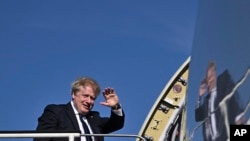British Prime Minister Boris Johnson, who is visiting India to deepen trade ties with one of the world’s fast-growing economies, said that the two countries hope to seal a free trade deal by the end of the year.
While the British leader will discuss the Ukraine crisis with Indian leaders, Johnson has indicated that he will not “lecture” New Delhi over its neutral stance on the hostilities or its decision to increase Russian oil imports – issues that have irked Western countries.
“India and Russia have historically a very different relationship, perhaps than Russia and UK have had in the last couple of decades. We have to reflect that reality,” Johnson said in Ahmedabad city in western Gujarat state, from where he began his two-day visit on Thursday.
Johnson, who met business leaders in Ahmedabad, said the trip would lead to investments from India to Britain worth about $1.3 billion.
The commercial deals are expected to create almost 11,000 jobs in Britain in sectors like software engineering and health.
Johnson and his Indian counterpart, Narendra Modi, are scheduled to hold talks on Friday.
Johnson said there was an opportunity to deepen the strategic and defense partnership between the two countries as Britain makes an “Indo-Pacific tilt” in its national security strategy.
“India and the UK both share anxieties about autocracies around the world, we're both democracies and we want to stick together," he told reporters.
Western countries including Britain have been pressing New Delhi to speak out against the war in Ukraine, but India, which is the world’s biggest buyer of Russia’s weapons, has refused to condemn the invasion and is sealing deals to buy more oil from Russia.
Britain is also hoping to wean India off its dependence on Russian arms. Before Johnson’s arrival, his spokesman, Max Blain, said that Britain would work with other countries to provide alternative options for defense procurements and energy for India but not “lecture other democratically elected governments on what course of action was best for them.”
Analysts in New Delhi said that India is unlikely to shift the diplomatic position it has taken on the Ukraine crisis and pointed out that there are limitations to how much Britain can help India, especially in terms of critical military hardware that it sources from Russia.
“The British prime minister’s message would certainly be taken on board but I do not see this making any tangible difference,” said Uday Bhaskar, director of the Society for Policy Studies in New Delhi. “Britain’s locus standi as an oil supplier is modest. It is also not in a position to supply to India the kind of military equipment that Moscow has been giving us over the last 50-60 years.”
The key focus of the visit will be on enhancing economic relations between the two countries as Britain tries to expand ties with Asian nations following its departure from the European Union.
India’s trade with Britain has not jumped at the same pace as with other countries like the United States – from third position as New Delhi's trading partner two decades ago, Britain has slipped to 17th position.
Hoping to change that, the two countries began negotiations on a free trade deal in January, which the British leader said would be clinched by the “end of the year, by autumn.”
While Britain wants more access to Indian markets and its huge middle class for products such as cars and whiskey, India is seeking removal of barriers that restrict access for its services and manufacturing industries. New Delhi has also long demanded easier access to British visas for students and skilled workers.




